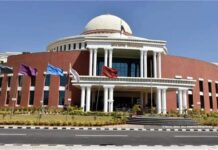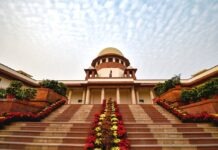The Supreme Court has sharply criticized the Delhi government for its ineffective enforcement of the firecracker ban, stating that the ban has been “hardly implemented” and contributing to the city’s deteriorating air quality. Following the Diwali celebrations, Delhi has once again been labeled the world’s most polluted city, with alarming levels of PM2.5 concentration pushing air quality into hazardous territory.
The court has instructed the Delhi government and the Delhi Police Commissioner to submit affidavits detailing the actions taken to enforce the firecracker ban this year, as well as plans for future compliance, within one week. This directive follows reports indicating that pollution levels in Delhi have reached an all-time high, surpassing those of the past two years. The Supreme Court emphasized the urgent need for accountability from the authorities tasked with implementing the ban.
Additionally, the court noted a rise in stubble burning cases around the Diwali period, prompting it to require the Punjab and Haryana governments to provide affidavits detailing incidents of stubble burning over the last ten days of October. The Delhi government has also been asked to report any instances of farm fires occurring within its jurisdiction during the same timeframe.
A bench consisting of Justice Abhay Oka and Justice Augustine George Masih indicated that it would broaden its inquiry to include other pollution sources, such as vehicular emissions, heavy truck traffic, and industrial pollution. This comprehensive approach aims to address the multifaceted nature of Delhi’s air quality crisis.
On November 1, the air quality index (AQI) surged past the severe threshold of 400 in multiple areas, exacerbated by the aftermath of Diwali celebrations. According to data from the Central Pollution Control Board (CPCB), several monitoring stations recorded alarming AQI levels early in the morning: Anand Vihar reached 433, Wazirpur 414, Jahangirpuri 413, Rohini 409, and Punjabi Bagh 404. The preceding day, Delhi reported its worst AQI of the season at 382, worsening from 316 the day before.
The Supreme Court’s next hearing on this critical issue is scheduled for November 14, underlining the urgency for coordinated action from both the Delhi government and neighboring states to combat the ongoing pollution crisis.




